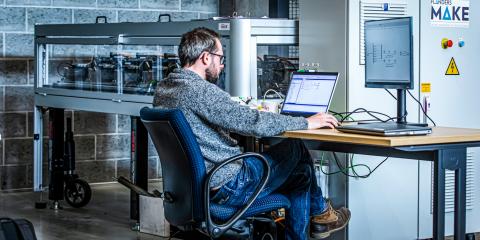Modular drivetrains: How Flanders Make is revolutionizing next-gen production machines

Lower product costs, faster delivery times and improved reliability. Mass customized products at mass production prices. This is what a factory of the future stands for and what manufacturing companies are working towards.
Modular drivetrains, and complete modularity in the product lifecycle, make it possible to solve this problem. But therefore, a companies’ design process needs to be enhanced, including a complete remap of the design philosophy, where companies can market specific (motion) products using a combination of standard design modules. However, such a change in design philosophy poses several challenges:
- Which modular drivetrain architectures will meet the company’s requirements?
- How can the company reliably design these new modular architectures?
- What new features and capabilities will be revealed by the new architectures?
Modular multi-actuated system (MMAS)
To address these challenges, our researchers have developed a solution called Modular Multi-Actuated System (MMAS). MMAS allows a production machine company to create a modular version of their existing (non-modular) architecture and assess its performance in terms of increase in speed and reduction in forces, energy consumption, internal dynamics and control accuracy. We built a working demonstrator with slider-crank mechanism to validate the approach.
The demo compares a non-modular, single motor and connected load benchmark with a fully modular, six motor and connected load system as shown below. This modular system runs 20% faster with 20-25% reduction in torque while consuming the same amount of energy. Compared to the non-modular benchmark, we achieve a 85-90% reduction in control error and internal dynamics. Reduction in dynamic error will lead to reduced level of internal forces. Reduction in internal forces can help to down-size the parts while also reducing wear. This will lead to lower material and maintenance costs.
Furthermore, this new architecture opens up new functionalities like electronically variable stroke, fault tolerance and graceful degradation as well as decoupled dynamics with respect to machine size. Electronically variable stroke is a feature differentiator that simplifies a machine operator’s life by eliminating the current manual approach and its accessibility challenges. Fault tolerance eliminates single point of failure which is highly beneficial for machines in a harsh or difficult to access environment (e.g., wind turbines, generators in remote areas). We have also developed a novel dynamic average consensus algorithm that includes active vibration damping. By implementing this, we have reduced the dynamic positioning error by up to 20%.

We are now looking forward to increase the automation in the modular design process as well as to optimize it on a system-level such that we can industrialize and valorize the benefits of our MMAS.